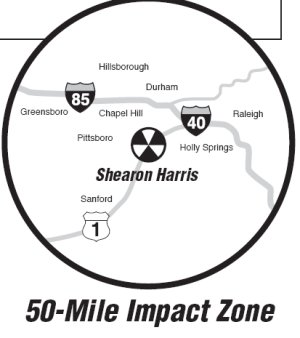It appears that Progress Energy has prevailed against local concerns the fire safety and overall security of their Shearon-Harris facility is less than adequate:
Progress Energy has cleared a hurdle in its bid to extend the operating license of the Shearon Harris nuclear plant by 20 years.
The Raleigh utility persuaded administrative law judges to reject safety concerns raised by nuclear critics who are challenging the license extension.
The groups want to litigate safety issues that the atomic board said fall outside the scope of a relicensing proceeding. Such proceedings are limited by law to reviewing a nuclear plant’s safety components and environmental impacts as the plant ages, the atomic board said.
I commented on NC Warn’s efforts in this recent post.

I’ve been following the mess at Shearon-Harris before the facility opened. Locally, our governments have to be concerned that this facility maintains the highest safety standards. For nearby communities – Pittsboro, Apex, Cary – the consequences of an accidental release present a devastating prospect. Closer to home, the economic and environmental reverberations would be significant.
The troubled NRCs role in this – their continued lack of oversight and willingness to bend what is in the best business interest of companies like Progress Energy – does not bode will for our community.
Luckily, local Representative David Price is aware of the fire safety issue and has promised to have the GAO look into the process to make sure the public good is well-served.
